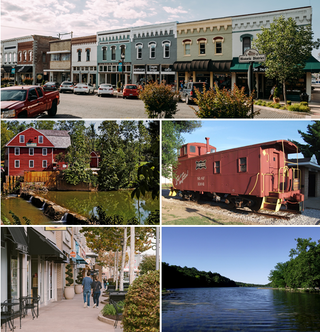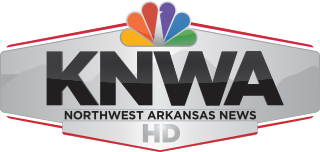
Rogers is a city in Benton County, Arkansas, United States. Located in the Ozarks, it is part of the Northwest Arkansas region, one of the fastest growing metro areas in the country. Rogers was the location of the first Walmart store, whose corporate headquarters is located in neighboring Bentonville. Daisy Outdoor Products, known for its air rifles, has both its headquarters and its Airgun Museum in Rogers. The city houses a popular shopping center, the Pinnacle Hills Promenade, and a music venue, the Walmart AMP, that has housed performances by big-name artists and local performers alike.

Pastured poultry is a sustainable agriculture technique that calls for the raising of laying chickens, meat chickens (broilers), guinea fowl, and/or turkeys on pasture, as opposed to indoor confinement. Humane treatment and the perceived health benefits of pastured poultry are causing an increase in demand for such products.

Free-range eggs are eggs produced from birds that may be permitted outdoors. The term "free-range" may be used differently depending on the country and the relevant laws, and is not regulated in many areas.

Free range denotes a method of farming husbandry where the animals, for at least part of the day, can roam freely outdoors, rather than being confined in an enclosure for 24 hours each day. On many farms, the outdoors ranging area is fenced, thereby technically making this an enclosure, however, free range systems usually offer the opportunity for the extensive locomotion and sunlight that is otherwise prevented by indoor housing systems. Free range may apply to meat, eggs or dairy farming.
American Humane (AH) is an organization founded in 1877 committed to ensuring the safety, welfare, and well-being of animals. It was previously called the International Humane Association before changing its name in 1878. In 1940, it became the sole monitoring body for the humane treatment of animals on the sets of Hollywood films and other broadcast productions. American Humane is best known for its certification mark "No Animals Were Harmed", which appears at the end of film or television credits where animals are featured. It has also run the Red Star Animal Emergency Services since 1916. In 2000, American Humane formed the Farm Animal Services program, an animal welfare label system for food products. American Humane is currently headquartered in Washington, D.C. It is a section 501(c)(3) nonprofit organization.

Chick culling or unwanted chick killing is the process of separating and killing unwanted chicks for which the intensive animal farming industry has no use. It occurs in all industrialised egg production, whether free range, organic, or battery cage. However, some certified pasture-raised egg farms are taking steps to eliminate the practice entirely. Worldwide, around 7 billion male chicks are culled each year in the egg industry. Because male chickens do not lay eggs and only those in breeding programmes are required to fertilise eggs, they are considered redundant to the egg-laying industry and are usually killed shortly after being sexed, which occurs just days after they are conceived or after they hatch. Some methods of culling that do not involve anaesthetics include: cervical dislocation, asphyxiation by carbon dioxide, and maceration using a high-speed grinder. Maceration is the primary method in the United States. Maceration is often a preferred method over carbon dioxide asphyxiation in western countries as it is often considered as "more humane" due to the deaths occurring immediately or within a second.
The Humane Society of the United States (HSUS) is an American nonprofit organization that focuses on animal welfare and opposes animal-related cruelties of national scope. It uses strategies that are beyond the abilities of local organizations. It works on issues including pets, wildlife, farm animals, horses and other equines, and animals used in research, testing and education. As of 2001, the group's major campaigns targeted factory farming, hunting, the fur trade, puppy mills, and wildlife abuse.

KNWA-TV is a television station licensed to Rogers, Arkansas, United States, serving as the NBC affiliate for Northwest Arkansas and the Arkansas River Valley. It is owned by Nexstar Media Group alongside Fort Smith–licensed Fox affiliate KFTA-TV and Eureka Springs–licensed MyNetworkTV affiliate KXNW. The stations share studios on Dickson Street in downtown Fayetteville, with a satellite studio in Rogers. KNWA-TV's transmitter is located southeast of Garfield, Arkansas.

Paul Shapiro is an American animal welfare writer who authored the 2018 book Clean Meat: How Growing Meat Without Animals Will Revolutionize Dinner and the World. He's also the CEO and cofounder of The Better Meat Co. and the host of the Business for Good Podcast. He has delivered five TEDx talks relating to sustainable food and animal welfare. Prior to publishing Clean Meat, he was known for being an animal protection advocate, both as the founder of Animal Outlook and a Vice President at the Humane Society of the United States (HSUS).

KFTA-TV is a television station licensed to Fort Smith, Arkansas, United States, serving as the Fox affiliate for the Arkansas River Valley and Northwest Arkansas. It is owned by Nexstar Media Group alongside Rogers-licensed NBC affiliate KNWA-TV and Eureka Springs–licensed MyNetworkTV affiliate KXNW. The stations share studios at the Underwood Building on Dickson Street in downtown Fayetteville, with a satellite studio in Rogers. KFTA-TV's transmitter is located in unincorporated northeastern Crawford County.

Beef cattle are cattle raised for meat production. The meat of mature or almost mature cattle is mostly known as beef. In beef production there are three main stages: cow-calf operations, backgrounding, and feedlot operations. The production cycle of the animals starts at cow-calf operations; this operation is designed specifically to breed cows for their offspring. From here the calves are backgrounded for a feedlot. Animals grown specifically for the feedlot are known as feeder cattle, the goal of these animals is fattening. Animals not grown for a feedlot are typically female and are commonly known as replacement heifers. While the principal use of beef cattle is meat production, other uses include leather, and beef by-products used in candy, shampoo, cosmetics, and insulin.

Organic egg production is the production of eggs through organic means. In this process, the poultry are fed organic feed. According to the United States Department of Agriculture, organic means that the laying hens must have access to the outdoors and cannot be raised in cages. Only natural molting can occur within the flock; forced molting is not allowed. Organic certification also requires maintenance of basic animal welfare standards.

Wayne Pacelle is an American animal rights and animal welfare activist, non-profit businessperson and author. Two of his books have been New York Times best-sellers. His official website can be found here.
Humane Farm Animal Care is a non-profit organization established to promote and administer its certification and labeling program, Certified Humane Raised & Handled, for meat, dairy, eggs and poultry raised under its animal care standards in the US. It is governed by a board of directors and retains a scientific committee which includes scientists and veterinarians. The organization is endorsed by the American Society for the Prevention of Cruelty to Animals.

NWA Roller Derby was a flat track roller derby league based in Fayetteville, Arkansas, (USA). Founded in early 2006, NWA Roller Derby was the first flat track league in Arkansas to play a version of roller derby using new standardized rules and a track design that was based on the dimensions of the old banked tracks, made popular by the founders of modern roller derby, the Texas Rollergirls. NWA Roller Derby also became the first member league out of Arkansas of the national organization, the Women's Flat Track Derby Association, announced by the WFTDA in December 2007.

Northwest Arkansas (NWA) is a metropolitan area and region in Arkansas within the Ozark Mountains. It includes four of the ten largest cities in the state: Fayetteville, Springdale, Rogers, and Bentonville, the surrounding towns of Benton and Washington counties, and adjacent rural Madison County, Arkansas. The United States Census Bureau-defined Fayetteville–Springdale–Rogers Metropolitan Statistical Area includes 3,213.01 square miles (8,321.7 km2) and 590,337 residents, ranking NWA as the 98th most-populous metropolitan statistical area in the U.S. and the 13th fastest growing in the United States.
The American Humane Certified program is the nation's first independent, third-party certification program to verify the humane treatment of farm animals. The program was launched in 2000.
The Humane League (THL) is an international nonprofit organization that works to end the abuse of animals raised for food through corporate, media and community outreach. It operates in the United States, Mexico, the UK and Japan. THL promotes plant-based diets, conducts research on the effectiveness of different interventions, and works to obtain animal welfare commitments from companies. It was founded in 2005 in Philadelphia by Nick Cooney.

Proposition 12 was a California ballot proposition in that state's general election on November 6, 2018. The measure was self-titled the Prevention of Cruelty to Farm Animals Act. The measure passed, by a vote of about 63% Yes to 37% No.
Ozark Catholic Academy is a Roman Catholic high school on the property of St. Joseph Catholic Church in Tontitown, Arkansas. It is affiliated with the Roman Catholic Diocese of Little Rock.














